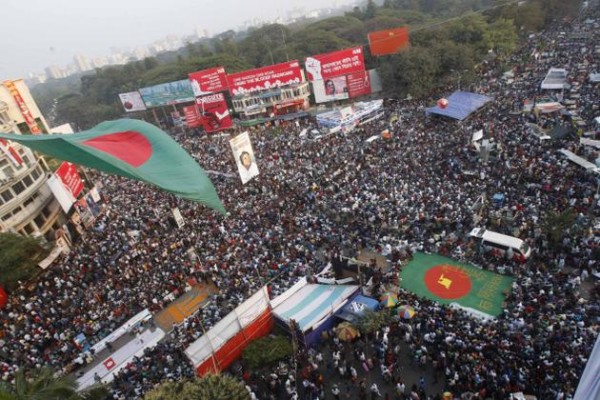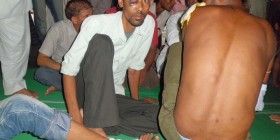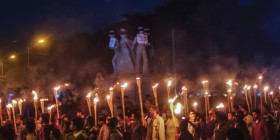For more than two weeks, the Shahbag area in the Bangladesh capital Dhaka has been the centre of an extraordinary protest, with tens of thousands converging there every day peacefully to demand that those convicted of 1971 war crimes must be given nothing less than the death sentence. In this interview with Nirupama Subramanian, Bangladeshi writer, columnist and development worker Farah Ghuznavi, who was in Chennai for The Hindu Lit for Life 2013, described the protests as a popular response to a national wound festering since 1971 that also mirrored present-day frustrations in the country, and said international concern about the shortcomings in the trial were “partially justified” but not of a scale that negated the outcome. The interview took place last week:
What’s happening at Shahbag in Dhaka?
I think you’re seeing a popular outpouring of frustration. It appears to be centred on one issue, but I think it’s wider than that. Essentially, we’ve been having the war crimes trials, which have been 40 years in the making. The first verdict was for someone who was sentenced in absentia to hanging; the second verdict was for somebody who is in the custody of the law enforcement authorities and the verdict was life imprisonment. And in response to that verdict, there was an outpouring of popular frustration which led to the throngs that you see in Shahbag.
What’s the frustration about? He’s been convicted.
The severity of the sentence. There was a feeling that if the previous verdict was death, the second case was at least as strong, and that it should have been given a similar verdict. Perhaps more importantly, there is a major concern that the [Jamaat-i-Islami] to which these two belong has previously been in an electoral alliance with [the Bangladesh Nationalist Party], and if that party comes to power in the next elections, there’s a chance that people [sentenced] to life imprisonment would not serve those sentences.
But it’s also important to see what’s happening in Shahbag as a multifaceted protest. For the common man or woman in Bangladesh, there isn’t really a pressure valve to let off steam about various things that are not working. Shahbag for many people is a channel for actually being heard and making their presence felt.
Internationally, there’s been concern that due process was not followed and that it was not a fair trial. Is there substance to these concerns?
Those fears are partially justified, but I think you also have to be realistic. A rather cynical friend of mine said that there may be flaws in this process but that there are also flaws in the judicial process in Bangladesh that affect people every single day. According to him, this is no worse than what an ordinary person experiences. In fact in this case, the world is looking on, so there’s some pressure being brought to bear. That does not justify the shortcomings in the system, but I’m not sure that they are of such a scale that it negates the verdict altogether. We do have to look at the fact that there is an enormous body of evidence and witness testimony.
There is also concern that a law has been changed after the verdict enabling the prosecution to appeal for stronger penalties, for the death sentence. There is criticism that the judges are being forced to cave in to voices on the street. Don’t you think that sets a bad precedent?
As I said, we have to deal with certain realities on the ground. I think you have to walk a balance between addressing valid concerns and living in an ivory tower regarding how optimally you’d like to do things. There have been some discussions about trials at The Hague. How long has each of these trials at The Hague taken? How much money have they cost? There has to be a happy medium somewhere between relying on national systems that don’t provide the international standards expected, and something that provided the expected international standards but takes forever and costs the earth.
In terms of changing of the legislation, this is the government’s way of making a political compromise with the protesters at Shahbag.
The youth are in the forefront of these protests. How is it that a generation that did not experience 1971 is alive to the horrors of the war crimes?
You’re talking about 40 years. Very, very many families lost one or more family members, or lost a friend. I’d be interested to see how many families are untouched by 1971. You’re talking about one generational memory. The memory of the Holocaust is alive and well, and the lobbying and the demands around it continue. It would be almost shameful if we forgot that quickly. For example, the Pakistan government has never apologised properly, there have never been reparations paid. You can’t heal until you cauterize a wound. You can’t just keep changing the dressing on it and refusing to do the actual lancing of a boil that is required.
I know lots of people who are progressive liberals who are completely torn about the fact that they are vehemently opposed to the death penalty, but they can see that the Shahbag movement has something inherently progressive about it. There is a terrible irony, in a way, that actually what you have is a progressive force out on the street demanding the death penalty.
Why are protesters asking for the Jamaat to be banned?
I think the fears are basically that they will have a disproportionate political representation in terms of having posts allotted as a result of the electoral alliance, which does not reflect the popular vote.
Are there fears that any quarter given to Jamaat now would help in the rise of fundamentalist Islam?
I think Bangladeshis in general have been religiously moderate. There hasn’t been a tendency towards religious extremism in the general population, and I think there is a low tolerance for it. You just need to look at the progress of women in the last 40 years. It is what you will see from U.N. statistics in the last 40 years — on infant mortality, maternal mortality, girls’ education. I don’t think you will find a single village in Bangladesh where you will find people willing to stand up and say that girls should not be educated… That doesn’t really fit very well with the religious fundamentalist profile.
The concern is that what should have been done 40 years ago was not done, and that this is almost the last stand for this particular issue. The Awami League government is the only one likely to undertake a war crimes trial, and I think right now the movement at Shahbag is seeking both to obtain what they feel is justice for the crimes committed, but also in terms of closing that chapter.





Leave a reply